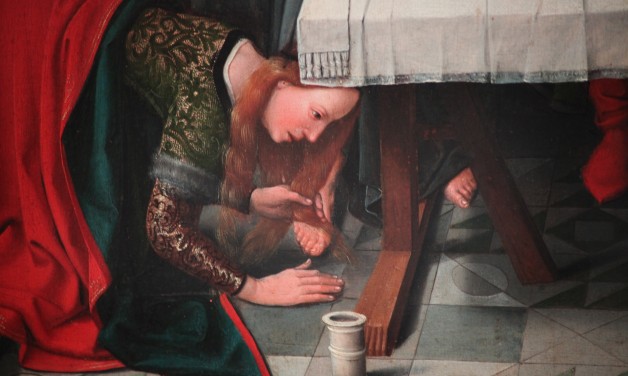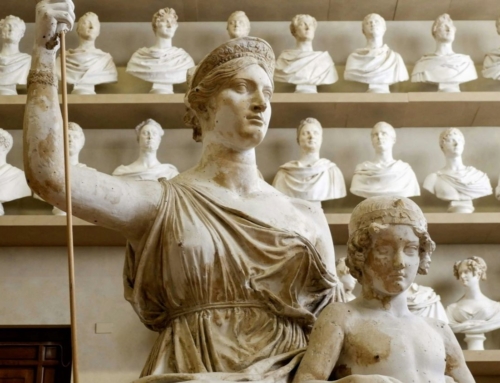Recently, I encountered a young woman struggling with many difficulties who turned all the bitterness in her heart against her faith. She launched into a diatribe about “not getting anything out of” her affiliation with the Church. The raw effusion of her anguish, as well as her conception of Jesus, brought to mind two of the characters from today’s Gospel.
Simon is a Pharisee who decides to invite Jesus to a banquet – no doubt well-respected and socially quite accomplished. The other character might be called a party crasher – an unnamed, sinful woman, who invites herself over, sneaks up behind Jesus, and proceeds to lose all control of her emotions – “bathing his feet with her tears,” wiping them with her hair, kissing them, and anointing them with perfumed ointment. St. Luke tells us twice that the woman is a sinner, probably because we’d have no idea otherwise. However by the time that the passage is over (if we haven’t already pre-judged him based on the label “Pharisee”), we’re pretty sure that Simon himself isn’t as sin-free as he thinks he is – smug in his own superiority over not only the sinful woman, but also over Jesus, whom Simon assumes is ignorant of the woman’s background.
Though both characters found themselves at a meal with Christ, Simon’s approach was that he was “doing Jesus a favor” by the meal, whereas the woman approached with faith, sure of Jesus’ power to heal her sinfulness. Certainly the woman had not casually decided to approach Him, but only after an honest self-examination, her tears motivated by grief at her own sorry sinfulness. Simon, on the other hand, never questions his own righteousness, and thus brings blindness to bear on two accounts: his own identity as a sinner, and Jesus’s identity as God.
This Gospel passage helps us understand how we can or should approach that meal with Jesus that is the Mass. Before the priest begins the Eucharistic Prayer, he invites us to “lift up [our] hearts.” When we attend Mass, what is burning within our hearts? What problem, what crisis darkens our hearts, or who or what fills them with joy? Do we keep either our doubts, anguish, or our gratitude to ourselves, like Simon? Like him, are we so sure that Jesus is not “God enough” to be able to handle it? Or do we recognize that no one but Him can do anything about it?
Who better than the woman in today’s Gospel shows us how this is to be done! She has begun with a hard and honest look at her heart – and found it full of sin. Yes, acknowledging this brings on great sorrow, but also the desperate need to seek out Jesus in order to be healed. The heart she lifts up is her own, though earlier in this chapter, St. Luke speaks of many others who have others “on their heart”: A widow wails for her dead son, a centurion calls out on behalf of his slave, and John the Baptist’s heart burns with questions of faith – Jesus satisfies them all. This is why, by the end of the passage, the woman – now forgiven – is known no longer as the “sinful” one, but as the “one who loved much.”
When we encounter Jesus this Sunday, let us ask for the grace to lift up our hearts to Him as freely and completely as the woman in today’s Gospel.
✠
Image: Dieric Bouts, Christ in the House of Simon the Pharisee (Detail)







